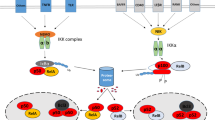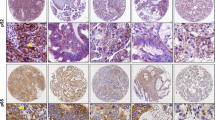Abstract
Purpose
Recent studies have indicated that constitutive NF-κB activity could be involved in the proliferation of triple-negative breast cancer.
Methods
The NF-κB/p65 expression and the effects of a NF-κB inhibitor, (−)-DHMEQ, were examined in triple-negative MDA-MB-231 breast cancer cells. Women with triple-negative breast cancer treated with neoadjuvant chemotherapy between 2002 and 2012 were retrospectively analyzed for their expression of NF-κB/p65, Bcl2 and Ki67 by immunohistochemistry in pre- and post-treatment specimens. The factors predicting the response to neoadjuvant chemotherapy and the prognosis were analyzed.
Results
NF-κB/p65 was predominantly expressed in the cytoplasm of MDA-MB-231 cells. Of 34 triple-negative breast cancer patients, positive staining for NF-κB/p65 expression was detected in the nuclei of a few cells in seven tumors before neoadjuvant chemotherapy, while the expression of NF-κB/p65 in the cytoplasm was detected in almost all tumor cells of 33 tumors. The expression levels of NF-κB/p65 were not associated with the response to neoadjuvant chemotherapy, although the cytoplasmic NF-κB/p65 staining intensity was significantly decreased in the post-treatment tumor samples compared with the pretreatment samples. All patients whose tumors showed strong cytoplasmic NF-κB/p65 expression before neoadjuvant chemotherapy are currently disease free.
Conclusion
Our results suggest that strong cytoplasmic NF-κB/p65 expression could be a prognostic marker for patients with triple-negative breast cancer.



Similar content being viewed by others
References
Foulkes WD, Smith IE, Reis-Filho JS. Triple-negative breast cancer. N Engl J Med. 2010;363:1938–48.
Lehmann BD, Bauer JA, Chen X, Sanders ME, Chakravarthy AB, Shyr Y, et al. Identification of human triple-negative breast cancer subtypes and preclinical models for selection of targeted therapies. J Clin Invest. 2011;121:2750–67.
Taketani K, Tokunaga E, Yamashita N, Tanaka K, Akiyoshi S, Okada S, et al. Early discontinuation of adjuvant hormone therapy is associated with a poor prognosis in Japanese breast cancer patients. Surg Today. 2014;44:1841–6.
von Minckwitz G, Untch M, Blohmer JU, Costa SD, Eidtmann H, Fasching PA, et al. Definition and impact of pathologic complete response on prognosis after neoadjuvant chemotherapy in various intrinsic breast cancer subtypes. J Clin Oncol. 2012;30:1796–804.
Jones RL, Salter J, A’Hern R, Nerurkar A, Parton M, Reis-Filho JS, et al. Relationship between oestrogen receptor status and proliferation in predicting response and long-term outcome to neoadjuvant chemotherapy for breast cancer. Breast Cancer Res Treat. 2010;119:315–23.
Lips EH, Mulder L, de Ronde JJ, Mandjes IA, Vincent A, Vrancken Peeters MT, et al. Neoadjuvant chemotherapy in ER+ HER2- breast cancer: response prediction based on immunohistochemical and molecular characteristics. Breast Cancer Res Treat. 2012;131:827–36.
Yoshioka T, Hosoda M, Yamamoto M, Taguchi K, Hatanaka KC, Takakuwa E, et al. Prognostic significance of pathologic complete response and Ki67 expression after neoadjuvant chemotherapy in breast cancer. Breast Cancer. 2015;22:185–91.
von Minckwitz G, Schmitt WD, Loibl S, Muller BM, Blohmer JU, Sinn BV, et al. Ki67 measured after neoadjuvant chemotherapy for primary breast cancer. Clin Cancer Res. 2013;19:4521–31.
Karin M, Lin A. NF-kappaB at the crossroads of life and death. Nat Immunol. 2002;3:221–7.
Karin M. Nuclear factor-kappaB in cancer development and progression. Nature. 2006;441:431–6.
Li N, Karin M. Signaling pathways leading to nuclear factor-kappa B activation. Methods Enzymol. 2000;319:273–9.
Sato M, Nakanishi K, Haga S, Fujiyoshi M, Baba M, Mino K, et al. Anoikis induction and inhibition of peritoneal metastasis of pancreatic cancer cells by a nuclear factor-kappaB inhibitor, (−)-DHMEQ. Oncol Res. 2013;21:333–43.
Yamaguchi N, Ito T, Azuma S, Ito E, Honma R, Yanagisawa Y, et al. Constitutive activation of nuclear factor-kappaB is preferentially involved in the proliferation of basal-like subtype breast cancer cell lines. Cancer Sci. 2009;100:1668–74.
Buchholz TA, Garg AK, Chakravarti N, Aggarwal BB, Esteva FJ, Kuerer HM, et al. The nuclear transcription factor kappaB/bcl-2 pathway correlates with pathologic complete response to doxorubicin-based neoadjuvant chemotherapy in human breast cancer. Clin Cancer Res. 2005;11:8398–402.
Montagut C, Tusquets I, Ferrer B, Corominas JM, Bellosillo B, Campas C, et al. Activation of nuclear factor-kappa B is linked to resistance to neoadjuvant chemotherapy in breast cancer patients. Endocr Relat Cancer. 2006;13:607–16.
Jones RL, Rojo F, A’Hern R, Villena N, Salter J, Corominas JM, et al. Nuclear NF-kappaB/p65 expression and response to neoadjuvant chemotherapy in breast cancer. J Clin Pathol. 2011;64:130–5.
Shapochka DO, Zaletok SP, Gnidyuk MI. Relationship between NF-kappaB, ER, PR, Her2/neu, Ki67, p53 expression in human breast cancer. Exp Oncol. 2012;34:358–63.
Watanabe M, Dewan MZ, Okamura T, Sasaki M, Itoh K, Higashihara M, et al. A novel NF-kappaB inhibitor DHMEQ selectively targets constitutive NF-kappaB activity and induces apoptosis of multiple myeloma cells in vitro and in vivo. Int J Cancer. 2005;114:32–8.
Umezawa K. Possible role of peritoneal NF-kappaB in peripheral inflammation and cancer: lessons from the inhibitor DHMEQ. Biomed Pharmacother. 2011;65:252–9.
Kurosumi M, Akashi-Tanaka S, Akiyama F, Komoike Y, Mukai H, Nakamura S, et al. Histopathological criteria for assessment of therapeutic response in breast cancer (2007 version). Breast Cancer. 2008;15:5–7.
Wolff AC, Hammond ME, Schwartz JN, Hagerty KL, Allred DC, Cote RJ, et al. American Society of Clinical Oncology/College of American Pathologists guideline recommendations for human epidermal growth factor receptor 2 testing in breast cancer. J Clin Oncol. 2007;25:118–45.
Jones RL, Salter J, A’Hern R, Nerurkar A, Parton M, Reis-Filho JS, et al. The prognostic significance of Ki67 before and after neoadjuvant chemotherapy in breast cancer. Breast Cancer Res Treat. 2009;116:53–68.
von Minckwitz G. Neoadjuvant chemotherapy in breast cancer-insights from the German experience. Breast Cancer. 2012;19:282–8.
Acknowledgments
We are grateful to Prof. Kazuo Umezawa, Aichi Medical University, and Dr. Tatsuya Yoshioka, Hokkaido P.W.F.A.C Obihiro-Kosei General Hospital, for their advice.
Author information
Authors and Affiliations
Corresponding author
Ethics declarations
Conflict of interest
None of the authors has any conflict of interest to declare in association with this study.
Rights and permissions
About this article
Cite this article
Baba, M., Takahashi, M., Yamashiro, K. et al. Strong cytoplasmic expression of NF-κB/p65 correlates with a good prognosis in patients with triple-negative breast cancer. Surg Today 46, 843–851 (2016). https://doi.org/10.1007/s00595-015-1265-5
Received:
Accepted:
Published:
Issue Date:
DOI: https://doi.org/10.1007/s00595-015-1265-5




